Want to Start a Wildflower School? Join Wildflower 101
- Jenny Tak
- May 24, 2017
- 2 min read
Updated: Feb 14, 2024

“So, what exactly makes a Wildflower school unique?” a parent familiar with Montessori education asked recently. This is a difficult question to answer concisely, and it’s one we get a lot at Wildflower. Every day, we get inquiries from people across the United States and around the world who want to learn more about our unique approach.
The reality is, there is so much that sets Wildflower schools apart.
It’s not just that they are small, responsive learning environments for children and families.
It’s not just that the teachers in the classrooms are also the administrators and leaders of the school.
It’s not just that all the schools are aesthetically beautiful and incorporate nature as part of both the form and function of the school.
In fact, there is so much that makes a Wildflower school unique, we realized we needed to create an opportunity for people who are intrigued by the potential of creating a Wildflower school themselves to delve into the principles and practices that unite our network.
We call the experience we created “Wildflower 101.” And so far, teachers and parents from a dozen states have traveled to participate in these lively three-day workshops. One group of Montessori teachers drove 15 hours (not including a flat-tire mishap in New York) to see Wildflower in action.
In thinking about how we can authentically communicate what it means to open and operate a Wildflower school, honest communication is essential. An in-person observation at one of the schools (an integral parts of the workshop) is worth a million words!
Inevitably, one of the most interesting topics that comes up in the workshop and inspires lively conversation is how we can take the beautiful spirit of support and autonomy (“freedom within limits” in Montessori-speak) that exists in the Montessori classroom and apply it to the work that we do as adults. We go into detail about the way in which teacher-leaders determine the roles and responsibilities at their schools. In a small school, teacher-leaders split tasks big and small– from giving lessons to filing taxes to taking out the trash.
Using a shared rubric to self-evaluate skill, interest and desired areas of growth, the teacher-leaders distribute roles and responsibilities. This is our way of encouraging a work environment tailored to the individual and one that is set up for success. Here is where we often see heads nodding eagerly as people realize how different their current work environment is compared to one in which they are empowered to do the work they love and feel supported in doing the work that is challenging.
As Wildflower evolves and develops new communities of schools, we will continue to host Wildflower 101 sessions on a regular basis. We want to share the spirit and practices that have brought us to where we are today, so that Wildflower can continue to spread to more communities.
Interested in learning more? Our next Wildflower 101 session is August 3-5, 2018, in Cambridge, Massachusetts. In the meantime, get in touch. We’d love to hear from you!



